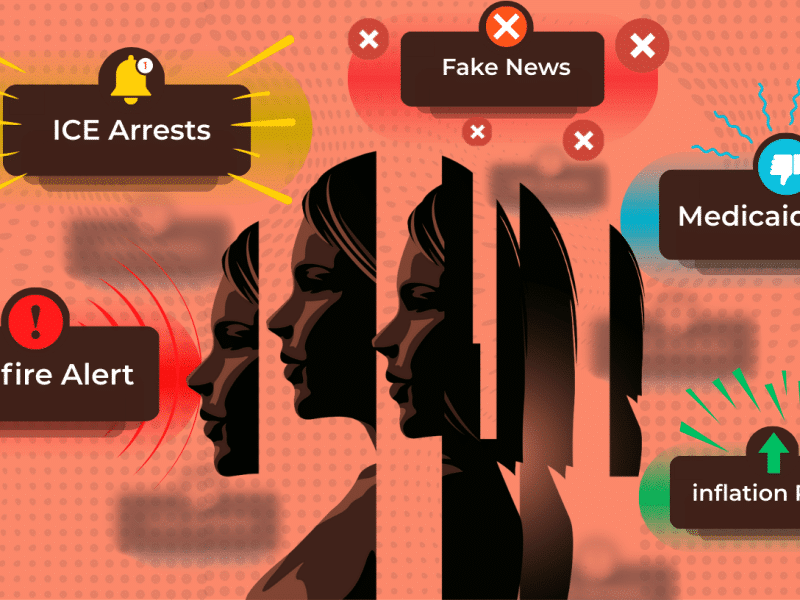Brujas, Unite! The Malas Palabras Affirmation Deck Is Here to Dismantle Taboos
Esoteric Esa, a leading spiritual voice in the Latine community, brings us her latest offering, the Malas Palabras Affirmation Deck, crafted with Latine culture in mind.

Leading Latina astrologist Jasmin Alejandrez-Prasad, better known as Esoteric Esa, is dropping a new affirmation deck, and her efforts to decolonize brujería are more focused than ever. The goal of the “Malas Palabras” affirmation deck is to empower Latinas to embrace taboo thoughts and all those “bad words” that we’re discouraged from saying or have been downright shamed for speaking.
Affirmation decks are cards that feature an uplighting or empowering sentence to encourage meditation and reflection. For many brujas and spiritual Latinas, affirmation decks are an important daily ritual and meditation practice.
Many people report that working with affirmation decks offers a quick boost of motivation, allowing you to tap into that chingona energy within. They encourage reflection and also offer a message that resonates within you, allowing you to integrate it into your thoughts and actions. More often than not, affirmation decks are focused on self-love, personal growth, emotional well-being, and more.
Esoteric Esa is taking a different approach, providing intentional affirmations that reframe dirty language into expressions of empowerment and anti-colonial resistance. The “Malas Palabras” affirmation deck contains 30 cards that explore themes like ancestral healing, sexual liberation, shadow work, and abundance mindset.
Luz got in touch with Esoteric Esa via email about her motivation behind the deck, and she shared, “I created this deck to remind those who are on their decolonial spiritual and healing journey that the process can be lighthearted. Oftentimes, we look at decolonial work and healing as very serious or intensive, which it is at times. However, it’s also okay to own your darkness because those sides of our identities serve a purpose as well. I want us to understand the power of our words, and how even bad words or phrases with negative stigma can be used for a high vibrational purpose when manifesting.”
The fact is that when you have been silenced or told to watch your words enough times, censoring yourself becomes second nature. This affirmation deck says “To hell with that!” and it invites you to hold space for yourself, speak your truth without filter, and manifest in a way that’s authentic to you. Enough of bending yourself into shapes you’re not meant to be in.
With the “Malas Palabras” affirmation deck, Esoteric Esa reminds you of a simple truth: your words are your power, and they are self-induced spells, so you should be using them to craft your own empowering narrative. This deck is a guide to do exactly that while transforming language for decolonial power.
If you’ve been hesitant to step into your bruja self, know that that’s colonization at work. To break from that, it’s important to honor ancestral traditions and practice your spirituality to connect with the universal consciousness, which is a distinct source of power. Embracing brujería with this perspective can guide you with greater purpose and help you dismantle the internalized biases that keep you away from beneficial practices.
The “Malas Palabras” affirmation deck is a great way to either dip your toes into or further your spiritual practice. Instead of denying taboo thoughts and shying away from bad words, this deck will help you embrace them and their power to become the baddie you know you should be.
Moreover, supporting a spiritual creator of color that truly represents your cultural background and identity is an additional important aspect. New Age decks made by white creators, whether that’s tarot or affirmations, completely ignore the nuances of our experiences as Latinos.
As Esoteric Esa puts it, “I wanted to create a place of intersectionality for the mixed Latines and those who have a lot of shame for not being ‘enough’ when it comes to the approval of Latinidad. This deck is rooted in smearing perfectionism, which is something I find often in New Age and White spiritual spaces.” She went on to emphasize that she intentionally incorporated Spanglish as an acknowledgment that not all Latinos are completely bilingual.
By prioritizing decks created by people of color, we not only support diverse voices within the spiritual community but also affirm the validity of our own cultural narratives. We reclaim our agency in shaping the spiritual landscape, ensuring that our stories, words, symbols, and traditions are honored and celebrated in their truest form.
When asked what she wants people to gain from this deck, she said, “Those who work with them will learn how to embody their energy from an authentically unapologetic mindset even further. That’s a very powerful place to manifest from, and incorporating these cards will help many rework through guilt and shame from Patriarchal colonial harm by exploring taboo topics from religious sexual oppression to mental health. The community can expect a fun and quirky introspective approach when integrating these into their spiritual practice. Especially since each card offers a tip as a journal prompt exercise to work with the power of the phrases more intimately.”
In the space of spiritualism and brujería, Esoteric Esa is one of the most respected voices in our community. She publishes in and contributes to major national outlets, including Cosmopolitan, PopSugar, Refinery29, and Bustle, among others. This new product reflects her values and core mission, which is to decolonize brujería and help Latinas shift their mindset for unapologetic, authentic transformation.
“Malas Palabras” Affirmation Deck
If you’re ready to speak the unthinkable, you can find the “Malas Palabras” affirmation deck here, ready for pre-order.




